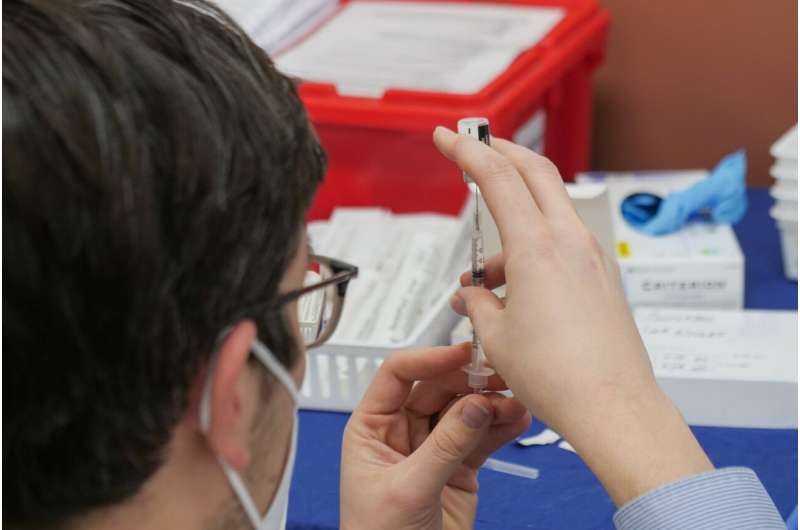
Interim data from a phase 3 trial of a COVID-19 vaccine developed in China (CoronaVac) suggests that two doses offer 83.5% protection against symptomatic COVID-19.
The preliminary findings, published in The Lancet and presented at this year’s European Congress of Clinical Microbiology & Infectious Diseases (ECCMID), indicate that CoronaVac induces a robust antibody response. No severe adverse events or deaths were reported among the more than 10,000 trial participants in Turkey, with most adverse events mild and occurring within 7 days of an injection. However, more research is needed to confirm vaccine efficacy in the long term, in a more diverse group of participants, and against emerging variants of concern.
CoronaVac uses an inactivated whole virus. When people receive the vaccine, their immune system attacks the harmless form of the virus by producing antibodies to fight it off, leading to immunity. Developed by Sinovac Life Sciences, the vaccine—which can be stored and transported at 2-8°C—has been approved for emergency use in 22 countries, and has been in phase 3 trials since mid-2020 in Brazil, Indonesia, Chile, and Turkey. In this trial, participants were given two 3μg doses of CoronaVac 14 days apart.
To date, interim efficacy and safety results of phase 3 trials have been reported for 8 COVID-19 vaccines: University of Oxford/AstraZeneca, Gam-COVID-Vac, Moderna, Pfizer, Janssen, Novavax, and two inactivated vaccines developed by Sinopharm.
Lead author Professor Murat Akova, from Hacettepe University Medical School, Turkey, said: “In order to bring the COVID-19 pandemic under control, the world needs every single dose of safe and effective vaccines, and our results add important evidence of the safety and effectiveness of inactivated-virus vaccines. One of the advantages of CoronaVac is that it does not need to be frozen, making it easier to transport and distribute. This could be particularly important for global distribution, as some countries may struggle to store large amounts of vaccine at very low temperatures.”
Between September 14, 2020, and January 5, 2021, 10,218 adults between 18 and 59 years were randomly assigned to receive two doses of the vaccine (6,650) or a placebo (3,568). The trial was conducted across 24 centres in Turkey. The average age of the participants was 45 years and 5,907 (58%) were male.
After the first dose, 87 participants in the vaccine group and 98 in the placebo group were excluded. The most common reasons for exclusion in the vaccine group were returning a positive COVID-19 test (60) and withdrawing from the study (11). The most common reasons in the placebo arm were unblinding before the second dose (45) and returning a positive COVID-19 test (35). A further 4 participants in the vaccine group were excluded after the second dose as they were aged over 59 years.
In total, 10,029 participants (6,559 in the vaccine group and 3,470 in the placebo group) were included in the efficacy analysis, and 10,214 participants (not including the 4 excluded who were over 59 years) were included in the safety analysis.
In total, 150 COVID-19 cases were confirmed by PCR after an average follow-up of 43 days, an incidence rate of 123 cases per 1,000 people per year. From 14 days after the second dose, 9 cases of symptomatic COVID-19 were confirmed in the vaccine group, an incidence rate of 32 cases per 1,000 people per year. In the placebo group, 32 cases were reported, an incidence rate of 192 cases per 1,000 people per year. Following analysis, the authors estimate that this is equivalent to a vaccine efficacy of 83.5%.
Analysis of immune responses induced by the vaccine involved a sample of 1,413 participants (981 from the vaccine group and 432 from the placebo group). CoronaVac induced an antibody response among 90% (880/981) of those who received the vaccine. The authors note that antibody response decreased with increasing age in men and women.
Adverse reactions were analysed using data from 10,214 participants (6,646 in the vaccine group and 3,568 in the placebo group). The incidence of adverse events in those who received the vaccine was relatively low at 19% (1,259/6,646). The incidence in the placebo group was 17% (603/3,568).
A total of 3,845 adverse effects were reported in 1,862 participants. Most of the reported adverse effects (90% [3,469/3,845]) were mild, and included fatigue, pain at the injection site, and myalgia. No severe adverse events or fatalities were recorded during the study period, and only 6 participants (<0.1%) in the vaccine group and 1 (<0.1%) in the placebo group were withdrawn from the study due to adverse events. Only one adverse event, an allergic reaction, required hospitalisation.
The authors acknowledge that the analysis included a short follow-up period and involved a relatively young and low-risk population. Further data is needed on the duration of protection, and safety and efficacy of the vaccine in elderly people, adolescents and young children, and those with chronic diseases. Data on the effectiveness of CoronaVac against variants of concern is also required. Study participants received doses 14 days apart, whereas community immunisation has involved a 28-day interval. While it has been claimed that 28-day immunisation schemes lead to better immunogenicity, the longer the interval, the higher the chances of contracting COVID-19 before getting fully immunised.
The phase 3 trial results published today follows an earlier phase 1/2 trial that reported on the safety and immunogenicity of CoronaVac in healthy children and adolescents.
Source: Read Full Article
